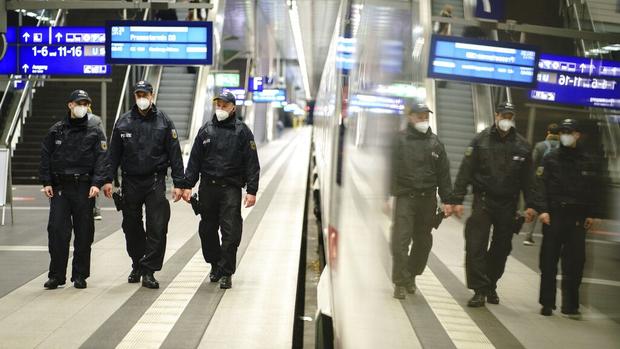 Officers of the German Federal Police patrol Berlin's central station to ensure commuters adhere to a mandatory mask wearing requirement at the German Railway in Berlin, Germany, on Dec 7, 2020. (KAY NIETFELD / DPA VIA AP)
Officers of the German Federal Police patrol Berlin's central station to ensure commuters adhere to a mandatory mask wearing requirement at the German Railway in Berlin, Germany, on Dec 7, 2020. (KAY NIETFELD / DPA VIA AP)
Business groups in Germany have expressed their anger about the government's decision to extend COVID-19 restrictions to March 7 and over "significant delays" in distribution of support payments.
Pressure from Germany's business community is growing for a way out of one of Europe's longest shutdowns. But Peter Altmaier, economy minister, on Tuesday dashed those hopes, saying the country could not risk another wave of infections.
In a virtual meeting with representatives of 40 industry associations, Altmaier, a member of Chancellor Angela Merkel's Christian Democratic Union, or CDU, said Germany was proceeding with caution "for fear of new coronavirus variants in neighboring countries", Reuters reported.
Politicians have raised the prospect of a potential easing of some restrictions after that date, but only if variants do not spread widely in the country, said German broadcaster Deutsche Welle, or DW.
The relatively strict lockdown measures are in contrast to Germany's neighbors France, Italy and Austria, where nonessential shops have reopened
The relatively strict lockdown measures are in contrast to Germany's neighbors France, Italy and Austria, where nonessential shops have reopened, and in cities such as Madrid in Spain, where restaurants and cafes are operating, a Financial Times report said.
The delay in the distribution of aid payments has caused dismay, with many businesses saying they are still waiting for compensation for November, which is when the new lockdown began.
ALSO READ: German economic data belie virus gloom
Guido Zollick, head of DEHOGA, the German association of hotels and restaurants, was quoted by the Financial Times and others as saying that "businesses are growing increasingly desperate, and angry" and that "more and more fear for their existence".
'Hardship' payments
During the meeting, Altmaier announced new emergency "hardship" payments for businesses and self-employed people, and said large companies with revenues of over 750 million euro (US$905 million) would now be able to request aid.
Figures show Germany has paid out 6.1 billion euros in emergency pandemic payments since November, The Irish Times said.
DW quoted the President of the German Employers' Association, Rainer Dulger, as saying that a "comprehensive overall approach" for the entire country was "still necessary".
The Financial Times noted a survey by EuroCommerce which found that in 19 of 31 European countries, all shops are now open, "even in places with much higher infection rates and numbers of deaths from COVID-19 than Germany".
In a separate report, the finance broadsheet said European countries are "preparing to scale back their unprecedented support measures for workers affected by the coronavirus pandemic".
The paper said an analysis of national statistics by the end of last year showed "more than 6 million jobs across leading eurozone economies" were still being supported by furlough programs. It said this is "fueling economists' calls for greater urgency" in helping them find work in "other industries".
READ MORE: German minister sees COVID-19 vaccine shortage well into April
Contact the writer at jonathan@mail.chinadailyuk.com


